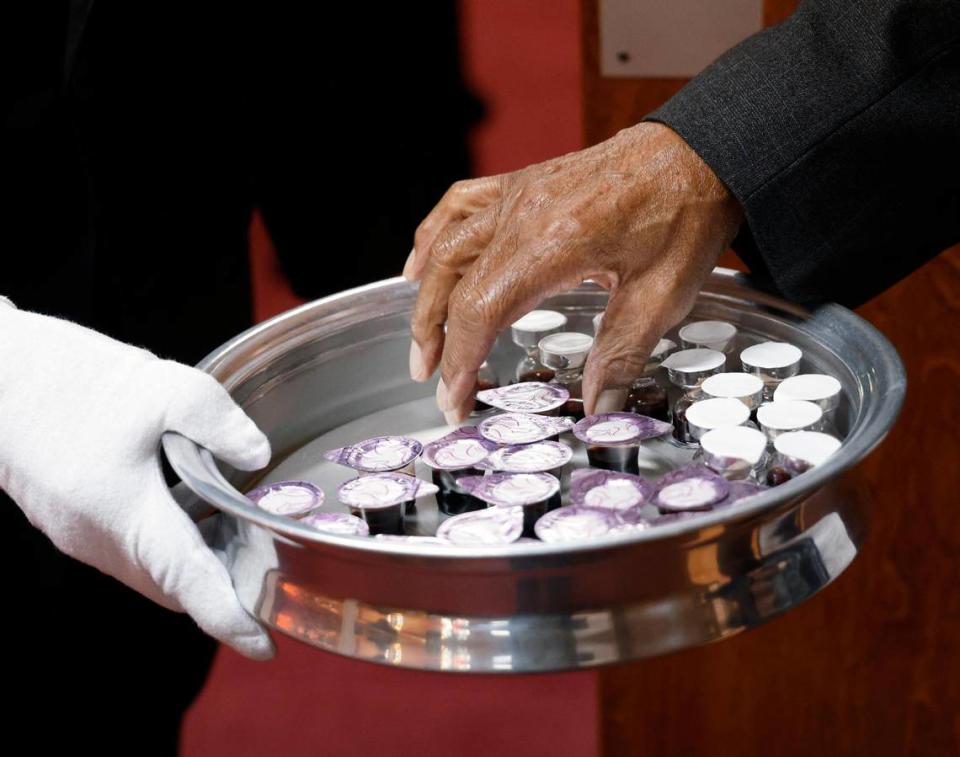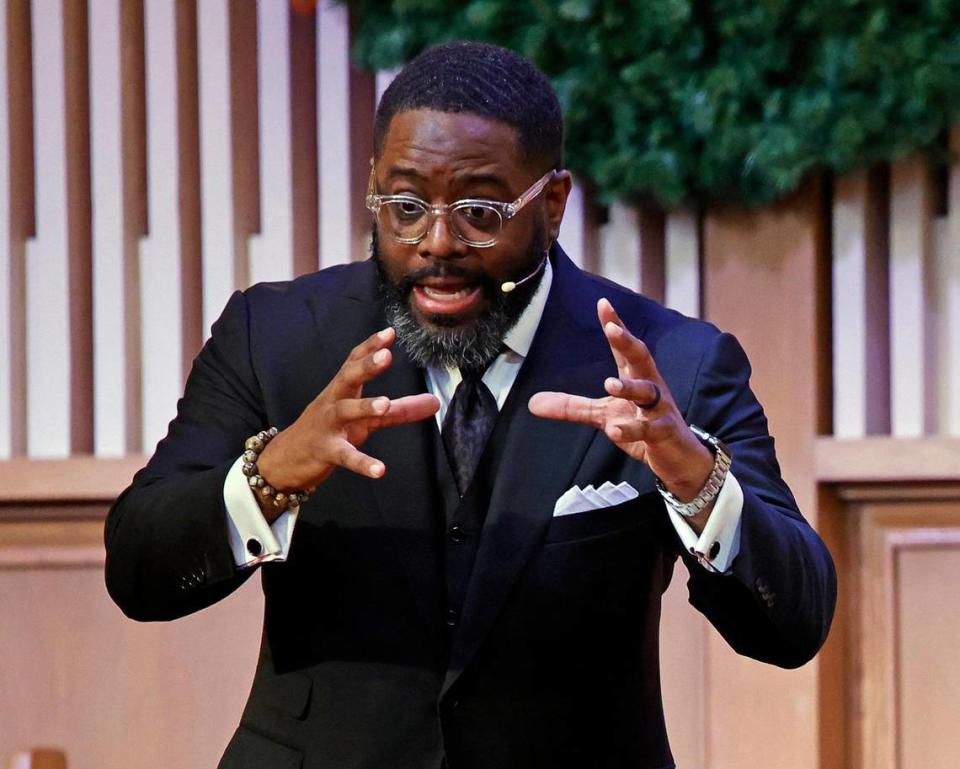For 120 years, this church has been a faithful presence on the north side of Fort Worth
Much has changed in the last 120 years on the north side of Fort Worth, but the presence of Shiloh Missionary Baptist Church has been a constant.
Yes, things at the church have changed, too, but members say Shiloh holds steady with its mission of love, faith and service to the community.
This weekend the church — at 2823 N. Houston St. — will celebrate its 120th anniversary. Members will reflect on the church’s history and the changes of the community with a special service at 10:20 a.m. led by Bishop J. R. Bryant of Baltimore.
The church’s origins go back to 1902 and a backyard where Sunday school classes were held for children of the neighborhood. From there, the church developed into a pillar of Fort Worth.
Van Warren, 75, has attended Shiloh nearly all of his life. His children and grandchildren have attended the church, and now his great-grandchild, Carsyn Warren, will become the sixth generation of the Warren family to be a member of the church.
“Shiloh was the mecca of the north side,” Warren said of the importance of the church in the community as he grew up.
John Kennedy, Warren’s grandfather, held the first Sunday school classes in his backyard. They were taught by Mrs. Cenie Stovall on the southwest corner of 24th and Ross Avenue.
Church first called Mt. Zion
Classes grew with the industrialization of the area, and the meat packing industry brought more families to the neighborhood. In 1903, Stovall and the Rev. John Heron of Mount Pisgah Baptist Church, organized the church, calling it Mt. Zion. It was the first Black church in the north side community.
In the fall of 1903, the Rev. J. D. Brown became the full-time pastor, and the church’s name was changed to Shiloh Missionary Baptist Church. In 1904, a small group of women began a fundraising campaign to buy two lots at Lincoln Avenue and Cliff Street. In the spring of that year, a tent was purchased and placed on the lots, and later the first building was constructed.
Brown died before seeing the church built. Over the years, the Sunday School was upgraded, a men’s bible study group was created, a Deacon Board was established, and a band was organized.

The Rev. J. W. Washington helped keep the church together through disasters such as the flooding of the Stockyards in 1942.
After Washington’s death in 1958, Shiloh Missionary Baptist Church called the Rev. Albert E. Chew Jr., 33, to serve as its 10th pastor. The first funeral Chew officiated was that of the church’s founder, Mrs. Cenie Stovall.
Warren remembers Chew and his wife Billie Joe as lovable figures of the community. Chew would play baseball with the kids, sit with Warren’s grandfather on his front porch, and his strong messages every Sunday would grab hold of churchgoers. His wife Billie Joe was like a mother figure to everyone. She was part of many community organizations but never sought the limelight, Warren said.
“I don’t know where I would be this day or many of us would be this day,” Warren said. “They always told us what we could be and what we could do because there were no limits.”
A move to North Houston Street
In 1960, the need arose for a new location for Shiloh. Eleven lots were purchased on North Houston Street for $17,000. A groundbreaking was held on Dec. 9, 1962, at 2823 North Houston St. The new building was completed in 1963 at a cost of $146,000.
In August 1967, Aby and Dorothy Lampkins and their four children moved from Dallas to Fort Worth and attended Shiloh because of a recommendation from their former pastor. The Lampkins describe it as a move across the street because Shiloh felt like extended family.
The same year, Pastor Chew called for the start a ministry for the deaf, which the Lampkins said many thought strange because members weren’t familiar with those who were deaf or communicating in American Sign Language. The Lampkins said they felt compelled to join the new ministry to help people understand it was not a novelty, but a way of life.
“Shiloh has played a big part in the advancement of the deaf community, Black and white,” Aby Lampkin said. “Because we all work together in the community.”
The Lampkins have been a part of the church’s Silent Ministry for over 50 years. Its members have traveled across the country and even to the Bahamas educating churches on how to accommodate the deaf community. The couple continues to advocate for deaf people in churches around the city.
Adapting to change
Shiloh continued under the Rev. Chew’s leadership until his death in 2015. After a search, the Rev. Kraig Lowell Pullam became the 11th pastor of Shiloh and was officially inaugurated in January 2017.
One of the challenges facing Pullam was the change from being a community church to a metropolitan church. He needed to embrace a changing demographic and adapt to a younger generation that was stepping away from the church.

Pullam said he knew the church’s methods had to change while it maintained its core mission as an empowering place where anyone could feel they belong.
“A church that is not growing is a church that’s dying,” Pullam said.
The church’s young adult ministry has open conversations ranging from topics such as “Is Hell real” to “Is it OK to be gay?” or any other questions young people struggle with. The church has partnered with schools such as Washington Heights Elementary and Kirkpatrick Middle School and provided them with uniforms, socks and underwear to help connect with those communities.
The church has an attendance of about 150 people on Sunday with a congregation that is 85 percent Black and 15 percent Hispanic. Pullam has searched for a Spanish translator or Hispanic minister to better serve his Hispanic congregation.
Pullam emphasized that the church is a place of refuge for all people.
“We don’t want to ignore the fact this is a place for the rejected, for the outcast, for the homeless person, the unemployed person, the straight person, or the gay person,” he said. “This is a church for anyone at any stage in life where they can come in, we want to be known as that.”
Continuing a legacy
Shirley Benton is the church’s historian and has been a member for 58 years.
She has watched members treat each other like family and traditions remain over the years.
Benton emphasizes that Shiloh is a tithing church that does its own funding for projects. None of it can be done without keeping love and faith among the diverse members of Shiloh Missionary Baptist Church, she said.
“We must keep our legacy going,” Benton said.

